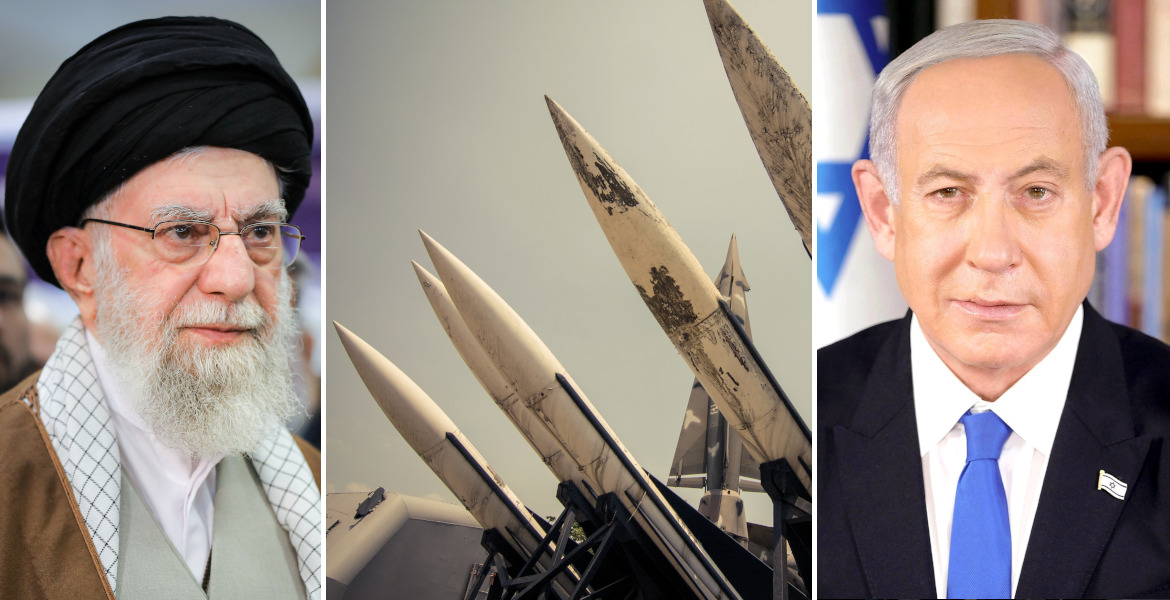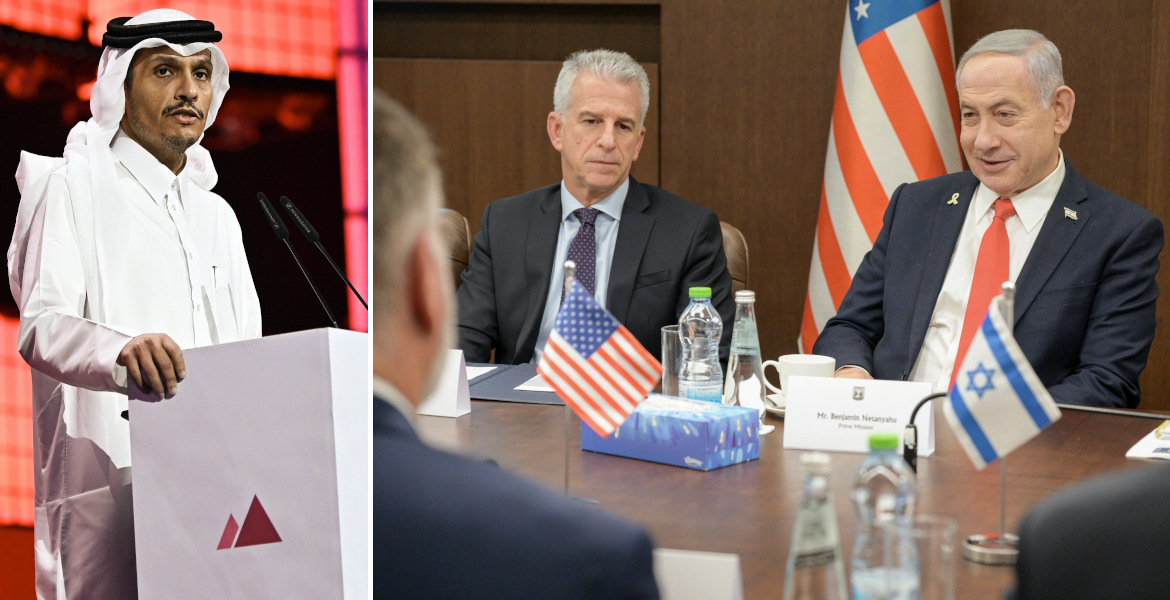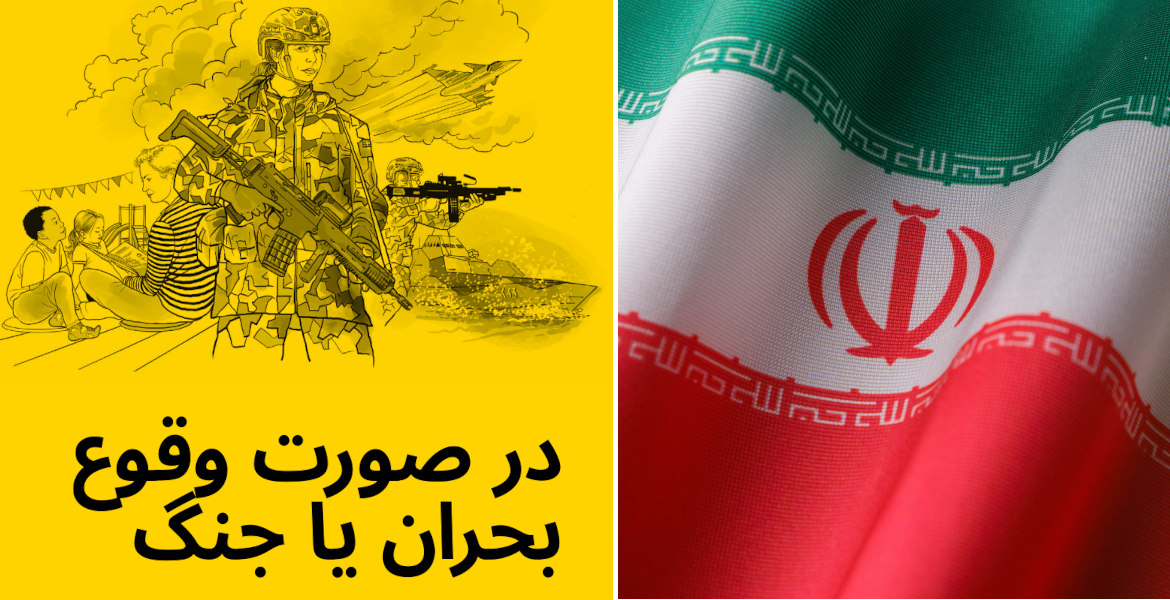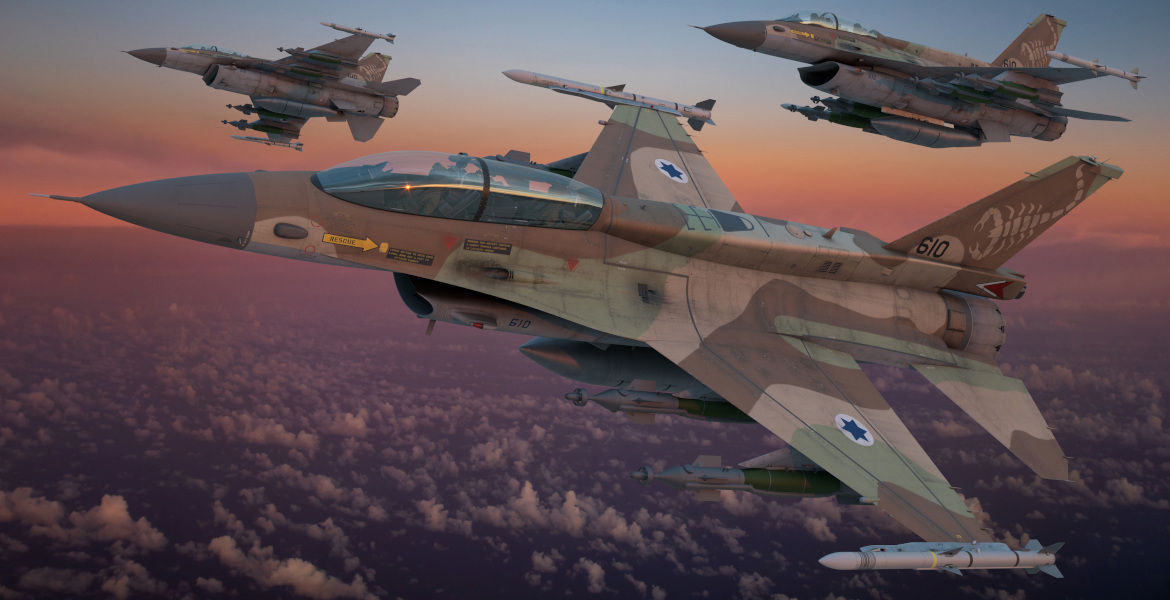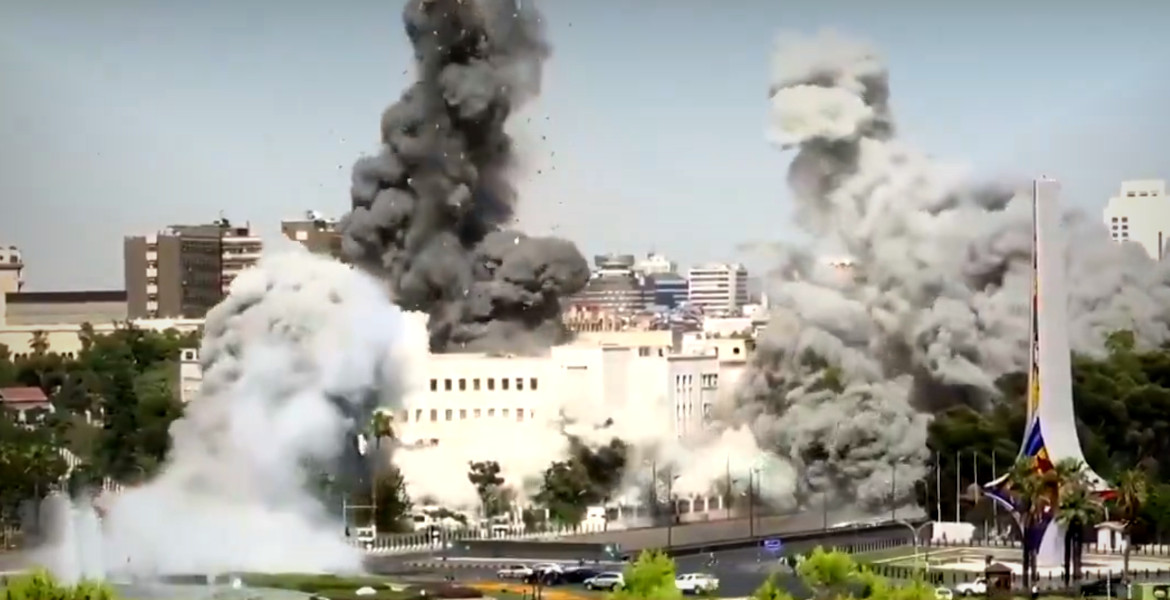The Bush administration's lies about Saddam Hussein's chemical weapons of mass destruction were used as a pretext to invade Iraq – a war project estimated to have cost between 500,000 and one million lives. In hindsight, it turned out that no such weapons existed – they were simply lies to force through a desired regime change and assert power over the region.
Today, the invasion of Iraq is considered one of the worst betrayals by Western leaders in modern times and is often cited as a textbook example of how those in power will not shy away from manipulating their own citizens or the rest of the world to get their way. Although the case of Iraq is extreme in terms of suffering and scale, the approach is by no means unique.
Forty-one years ago, during the Cold War, the British defense magazine Jane's Defense Weekly sounded the alarm with an unexpected report. "Iran is engaged in the production of an atomic bomb, likely to be ready within two years", it claimed. The same claims were trumpeted by the Israeli media and US Senator Alan Cranston, who insisted that Iran was about seven years away from being able to manufacture its own nuclear weapons.
However, there was never any real basis for these claims, and the International Atomic Energy Agency (IAEA) also dismissed the alarm as unfounded. In retrospect, it was also clear that the statements were politically motivated scare tactics rather than serious predictions. Iran did not acquire nuclear weapons, either in the 1980s or later.
The fact that the alarms about Iran’s supposedly imminent nuclear threat had no grounding in reality mattered little. The steady stream of similar pronouncements continued to pour out from high-ranking Israeli and American officials.
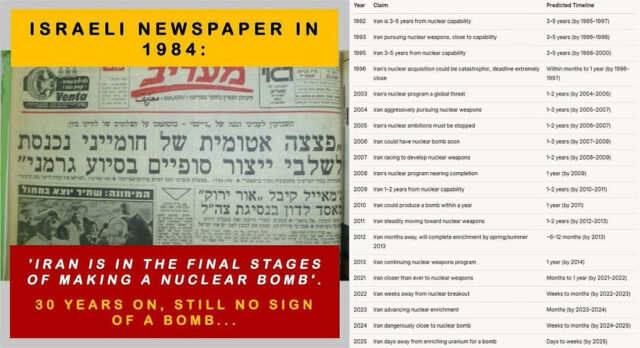
All predictions were wrong
Israel's current Prime Minister Benjamin Netanyahu declared in the early and mid-1990s, when he was a member of parliament, that Iran could be only a few years away from acquiring nuclear weapons and demanded decisive action. During the same period, Israeli Foreign Minister Shimon Peres claimed that Iran would have a nuclear warhead by 1999, and in the US, a report by the House of Representatives' Republican Research Committee claimed that Iran was "98 percent certain" to already have all the components needed to build "two or three operational nuclear weapons".
At around the same time, under President George H.W. Bush, the CIA assessed that Iran had all the components needed for a couple of bombs, and predicted that Iran would have nuclear weapons by 2000 – a forecast that was later postponed to 2003.
These forecasts were also completely divorced from reality. The key was to portray the Iranian regime as a global threat that must be fought – and crushed with military force if necessary. This has continued, with constant alarmist and propagandistic warnings rather than serious and objective analysis. In 1995, for example, the New York Times reported that high-ranking US and Israeli officials warned that Iran would acquire a nuclear bomb by 2000.
"Iran is much closer to producing nuclear weapons than previously thought", the newspaper trumpeted, citing information from US and Israeli officials, and it was claimed that Iran's atomic bomb was "at the top of the list" of dangers for the coming decade.
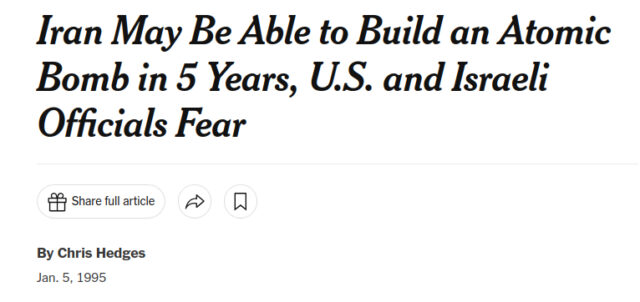
Not yet – but soon?
When these deadlines passed without anything actually happening, the timeframes were pushed forward. In 1997, new estimates suggested that the Iranian bomb would not be ready until around 2007–2009.
During the 2000s, the warning signals and doomsday messages continued to echo. In 2005, Israel's defense minister (Shaul Mofaz) stated that Iran would pass a “point of no return” in its nuclear weapons program within two years – which placed the critical date around 2007. In 2007, the Israeli intelligence service Mossad claimed that Iran could achieve nuclear weapons capability by 2009.
A 2009 forecast was even more alarming, claiming that Iran would be “nuclear armed” within a year. At the same time, more and more analysts began to question the credibility of the timelines and question why the forecasts were constantly being pushed forward, and why the new estimates should be more credible than the incorrect ones that had been made previously.
It's kinda like climate change
12 years ago Sept 2012
Benjamin Netanyahu warned the United Nations on Thursday that Iran will have enough enriched uranium to make a nuclear bomb by next summer and urged the
world the draw a clear "red line" to stop it in its tracks. pic.twitter.com/3j2Ixum83z— Joni Job (@jj_talking) June 16, 2025
Despite the 2015 international nuclear agreement, leaders in Israel and the US continued to warn of Iran's alleged nuclear ambitions. In September 2012, Netanyahu made a high-profile appearance at the UN General Assembly: he held up a sketch of a bomb and drew a red line with a red pen at 90 percent enrichment, warning that Iran would reach this final stage toward a bomb by spring or summer 2013 unless it was stopped.
In 2015, Netanyahu addressed the US Congress and criticized the new nuclear agreement, saying: "It doesn’t block Iran’s path to the bomb, it paves Iran’s path to the bomb".
In August 2021, it was time once again for Israel's Defense Minister Benny Gantz to sound the alarm that Iran was only "about 10 weeks away" from obtaining enough weapons-grade material for a nuclear warhead.
Powerful interests want to see Iran burn
This, it should be emphasized, is only a small selection of all the statements and warnings about alleged threats that have never materialized. Over the past four decades, both American and Israeli leaders have had an even stronger incentive to portray Iran's nuclear program as an urgent, global threat. First, the threat creates a political and strategic basis for justifying massive military support for Israel and permanent US military operations in the region.
Every warning about "imminent" nuclear weapons provides justification for congressional decisions on increased defense spending, arms exports, and a military presence in the Gulf region, which benefits arms manufacturers and maintains a powerful US presence in the oil-rich region.
Hit Iran now. Hit them hard.
— Lindsey Graham (@LindseyGrahamSC) January 28, 2024
Furthermore, the threatening rhetoric also strengthens Israel's demands for international support against Tehran, which consolidates the country's position of power in the region and legitimizes “preventive” military operations against Iran. By constantly repeating that "we only have weeks or months left", it has been possible to maintain a permanent high-risk situation that facilitates quick decisions on sanctions or military threats whenever political leaders want to take a harder line against Iran.
At the same time, political financing in the US has also played a decisive role. Many members of Congress receive large contributions from pro-Israel lobby groups such as AIPAC, which consistently advocate a tough line against Iran to protect Israel's security and interests. The Israel lobby's ads in US election campaigns often portray any negotiations with Tehran as a moral failure, which has pushed US foreign policy in an extremely pro-Israel and neoconservative direction.
Ted Cruz on Iran. Full interview tomorrow. pic.twitter.com/hJNwAHAnxZ
— Tucker Carlson (@TuckerCarlson) June 18, 2025
Similarly, Christian groups in the US, especially evangelicals, have long viewed Israel's continued existence as a religious duty, whereby "those who bless Israel shall be blessed themselves" – and constitute a significant voter base that demands a tough confrontation with Iran. For these groups, a potential major war is not only a geopolitical possibility but also a step in prophetic eschatological patterns.
All in all, there are several influential groups that, for economic, geopolitical, or religious reasons, have an interest in keeping Iran's "imminent" nuclear threat alive – even though none of the predictions have ever come true and there is no indication that they have ever been close to doing so.
What is Trump basing his decisions on?
Many had hoped that things would be different with Donald Trump, given his claims that he would be the one to "end all wars".
– My proudest legacy will be that of a peacemaker and unifier, he has confidently declared.
In reality, however, a different picture emerges, with Trump choosing to completely ignore the assessment of his own intelligence chief when the latter states that there is no indication that Iran is on the verge of acquiring nuclear weapons.
– Iran is not building a nuclear weapon and Supreme Leader Khamenei has not authorized the nuclear weapons program that he suspended in 2003, DNI Director Tulsi Gabbard recently stated, referring to the intelligence community's collective assessment.
Trump keeps repeating that "Iran can't have a nuclear weapon" to desensitize his base about going to war with Iran.
Tulsi Gabbard in March, 2025: "Iran is not building a nuclear weapon." pic.twitter.com/3GCoSicQ9b
— Blue Georgia (@BlueATLGeorgia) June 17, 2025
– I don’t care what she said. I think they were very close to having one (nuclear weapon), Trump stated, when journalists asked him why he was ignoring the assessments of his own experts and advisors.
"I dont care what she said, I think they were very close"
President Trump's reaction to the claims, of his own National Intelligence Chief, @TulsiGabbard
Claiming that Iran was not close to building a Nuclear Weapon. pic.twitter.com/TSek6D4ARr— Chay Bowes (@BowesChay) June 17, 2025
The fact that IAEA chief Rafel Grossi also confirms that there is no evidence "of a systematic effort (by Iran) to move toward a nuclear weapon" does not seem to matter to the US's top leaders either. Trump has, by all accounts, decided to follow Netanyahu's war line – despite the fact that it has been proven false for decades.
“We did not have any proof of a systematic effort to move into a nuclear weapon.” @iaeaorg Director General affirms his agency’s findings about Iran’s nuclear program. pic.twitter.com/TmHx7rtfjJ
— Christiane Amanpour (@amanpour) June 17, 2025
A betrayal of the movement
Trump's popularity has been largely built on promises to end expensive, protracted, and globalist wars. Now, the capricious president is dismissing his promises with vague neoconservative arguments that the US cannot become “great” as long as Iran has or could obtain nuclear weapons, and that this should therefore be the top priority for all American patriots.
During his previous term, Trump was heavily criticized for failing to deliver on his campaign promises. Many analysts explained this by saying that they were blocked by political opponents, but other critics also pointed out early on that he chose to surround himself with advisors with questionable agendas that were directly harmful to the US, such as his ultra-Zionist son-in-law Jared Kushner and the neoconservative hawk John Bolton.
This time, it would be different. Now, the administration would be made up of reliable and stable people who put the US first and prioritized what was good for the American people –not powerful special interests or foreign regimes.
That does not seem to have been the case. When it comes to Iran and the Middle East, the Americans and the world have, on the contrary, got a president in Trump who in practice may be even more belligerent than several of his despised predecessors. In recent days, his feed has been filled with warmongering neoconservative rhetoric and demands for Iranian submission.
“UNCONDITIONAL SURRENDER!” he thunders in a post on Truth Social, among other things.
"We know exactly where the so-called 'Supreme Leader' is hiding. He is an easy target, but is safe there - We are not going to take him out (kill!), at least not for now. But we don’t want missiles shot at civilians, or American soldiers. Our patience is wearing thin", he threatens in another.
"AMERICA FIRST means many GREAT things, including the fact that, IRAN CAN NOT HAVE A NUCLEAR WEAPON. MAKE AMERICA GREAT AGAIN!!!", he proclaims in a third.
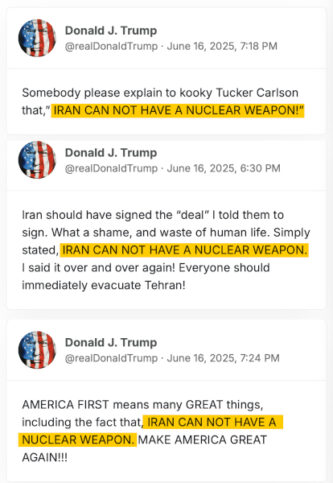
Who makes the decisions?
Trump has certainly long had an eccentric public persona, but even many of his own supporters on social media are wondering what is really going on. Wasn't Joe Biden the crazy president who was dragging the US into war and misery – not Trump?
Others cannot understand why the US president continues to shout about Iranian nuclear weapons when all relevant experts have already stated that there is no evidence whatsoever that such a threat is imminent. Where did he actually get his information from, how does he make his assessments, and why are they so irrational? These are the questions being asked. No answers seem to be forthcoming, except that the US is sticking to its line that Israel's wishes take precedence over everything else.
Therefore, it does not matter to Trump that it is Israel – not Iran – that has illegally and in the utmost secrecy acquired a large number of nuclear weapons and used them to press for US military support or deter hostile neighbors in conflicts.
Former Trump chief strategist Steve Bannon on how the president’s enemies are working to destroy MAGA with the war on Iran.
(0:00) Will the Iran War Be the Downfall of MAGA?
(6:55) Fox News’ Pro-War Propaganda
(12:42) The Never-Trumpers Pretending to Be On Trump’s Team
(15:30)… pic.twitter.com/PdUZFiUNNZ— Tucker Carlson (@TuckerCarlson) June 16, 2025
There is widespread concern among Trump's voter base that, despite all his promises of peace, Trump once again appears to be throwing the US into a major war based on lies and disinformation – exactly as was the case with the invasion following the fabricated chemical weapons allegations in Iraq in 2003. Many Americans are resigned to the fact that this is not at all what they voted for.
Opponents of US involvement in Israel's war against Iran also point out that those who are most vocal in calling for another US war are power brokers who do not actually support Trump or the MAGA movement, but see the war as an opportunity to split or crush the movement that has built up around him.
The coming days and weeks will not only define Trump's political legacy, but the future of the entire Middle East. Perhaps even the world's.
A selection of warnings about an imminent Iranian nuclear threat:
1984 – Jane’s Defense Weekly: Iran may have nuclear weapons within two years.
1992 – Benjamin Netanyahu: Iran close to having a bomb by 1999.
1993 – Yitzhak Rabin: Iran is building nuclear weapons, the world must act.
1995 – US government: Iran's nuclear weapons plans must be stopped
1998 – Madeleine Albright: Iran is trying to acquire nuclear weapons.
2000 – Bill Clinton: Law against support for Iran's weapons program.
2002 – George W. Bush: Iran threatens with nuclear weapons plans.
2004 – U.S. National Intelligence Estimate: Iran probably moving toward nuclear weapons.
2005 – Ariel Sharon: Iran close to technical solution for bomb.
2006 – George W. Bush: Iran's nuclear plans threaten peace.
2007 – US intelligence: Iran paused its weapons program in 2003 but is rebuilding capacity.
2008 – Ehud Olmert: Iran close to irreversible nuclear weapons point.
2009 – Benjamin Netanyahu: Iran three to five years from bomb.
2010 – Barack Obama: Iran's nuclear program a major threat.
2011 – Leon Panetta: Iran could have a bomb within a year.
2012 – Benjamin Netanyahu: Iran close to the “red line” for nuclear weapons.
2013 – Moshe Ya’alon: Iran very close to the nuclear threshold.
2014 – Benjamin Netanyahu: Iran on its way to becoming a nuclear power.
2015 – Benjamin Netanyahu: JCPOA (nuclear agreement with Iran) paves the way for Iran's bomb.
2017 – Donald Trump: Iran could quickly obtain nuclear weapons.
2018 – Mike Pompeo: Iran is seeking nuclear weapons despite JCPOA.
2019 – Benjamin Netanyahu: Iran close to manufacturing an atomic bomb.
2020 – Donald Trump: Iran economically weak but nuclear threat remains.
2021 – Joe Biden: Iran must comply with JCPOA to stop nuclear weapons.
2023 – Yoav Gallant: Iran closer to the bomb than ever.
2024 – US intelligence: Iran months away from nuclear weapons.
2025 – Benjamin Netanyahu: Iran could build nine nuclear weapons.
2025 – Donald Trump: US could bomb Iran if nuclear program is not stopped.
